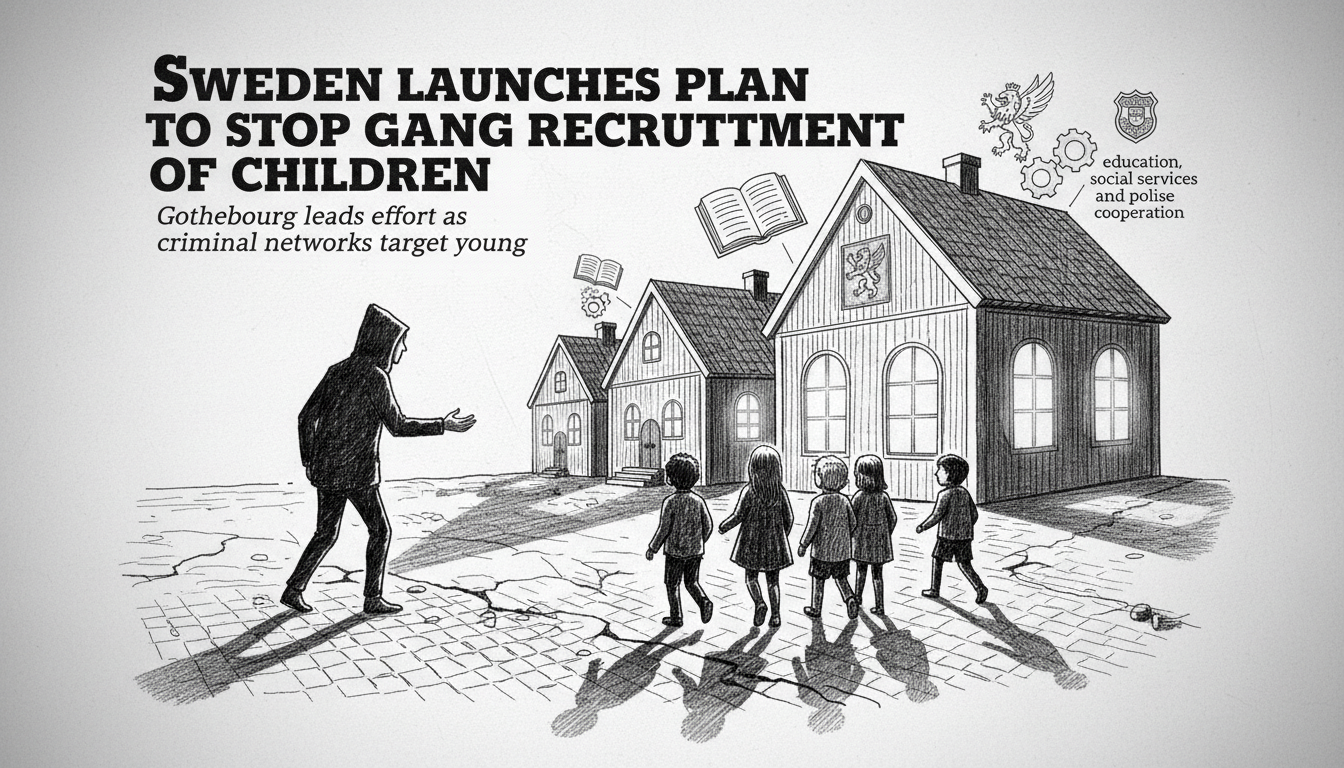Sweden Launches Plan to Stop Gang Recruitment of Children
Sweden launches emergency schools and kindergarten interventions to combat gang recruitment of children as young as eight. Gothenburg leads the effort as criminal networks increasingly target younger children for violent crimes. The strategy combines education, social services and police cooperation to break recruitment cycles.

Gothenburg mayor Jonas Attenius says Sweden must act early to save children from criminal gangs. "We must do everything we can to save every single child," he stated. "And we must start early."
Swedish criminal gangs have recruited minors for years to carry out attacks. Recent weeks show similar patterns emerging in Norway.
Gothenburg's political leadership now fights child recruitment with measures in elementary schools and kindergartens. "We've seen worrying development with explosions and shootings here in Gothenburg recently," Attenius explained. "This trend is spreading beyond major Swedish cities."
The situation escalated as violence occurs publicly among ordinary people, often in broad daylight. Attackers' ages keep dropping. Authorities see children as young as nine or ten drawn into criminal environments and given various assignments.
"The situation is incredibly tragic," Attenius said. "We must choke this recruitment and put all force against this vicious cycle."
Starting January 2026, Gothenburg introduces "Emergency Schools" for children aged 10-12. This program previously served 13-15 year olds. Officials now see need among younger students too.
The system works like this. If concerns emerge about a student potentially involved with criminal networks, authorities remove them from class. Multiple support services then engage around the child including parents, social services, counselors and various specialists.
Students can only participate in this program for 20 days maximum. After this period, authorities assess whether the child returns to original class, joins new class, or transfers to resource schools with more teachers and resources.
Gothenburg city council also addresses younger children. Eight new social worker positions will identify concerning signs among kindergarten children next year.
"We can see worrying signs in children as young as three to five years old," Attenius noted. "We want to support early at kindergarten level with social kindergarten teams."
The kindergarten social worker initiative costs 2.7 million Swedish kronor. Social workers will support kindergarten staff and identify early warning signs to slow negative development. Some children have fathers connected to criminal networks, creating vulnerable upbringing environments.
Attenius expressed regret about similar incidents involving youth and gang crime in Norway. "Norway and Sweden are two strong countries," he said. "It's very unfortunate we have this societal development in our countries. We must cooperate and work crime preventively."
One 13-year-old detained in connection with a grenade attack in Oslo's Bislett neighborhood was connected to child welfare services.
Gothenburg's councilor for social services Jenny Broman confirmed similar recruitment occurs at Swedish child welfare institutions called HVB homes. Criminals have even worked at or operated private HVB homes.
"That's completely unacceptable," Broman stated. Authorities now focus intensely on ensuring HVB homes are owned and operated by people without criminal connections. Staff must have proper education.
"This should be obvious," she said. "But now we check carefully. This is actually a state task in Sweden, but we do it anyway. We feel we cannot wait until it's randomly discovered."
Police leader Johan Sone leads the crime prevention project "Rätt Kurva" (Right Turn). This police-social services collaboration targets children aged 8-15.
"Children are recruited in very cynical ways to commit serious crimes orchestrated by serious criminals who aren't even in Sweden," Sone explained. "Children are used as tools in organized crime today."
When the project began three years ago, people shook their heads at targeting eight-year-olds. Today there's broad acceptance for starting prevention efforts this early.
Sone wouldn't specify exact numbers but confirmed under one hundred children currently participate in Rätt Kurva.
The identification process begins in each police district. Designated police officers monitor all crime in their areas, particularly offenses committed by children aged 8-15.
Each month, authorities assess which children to discuss with social services for potential support.
Many risk factors surround these children including family unemployment, general exclusion, poverty, and resource-weak families. These conditions limit opportunities for sensible leisure activities and connections with reliable adults.
The program maps family challenges and creates action plans addressing work, school, leisure, mentorship, language courses, finances, or housing changes. A social worker manages each case with the family and has many resources available.
This voluntary program lasts three years and requires active participation from families including both parents and the children themselves.
Businesses actively contribute through the emergency preparedness association Beredskapsløftet which coordinates assistance.
Sone emphasizes Rätt Kurva isn't the solution to Sweden's serious situation but an important contribution. "It's not the solution in other countries either," he said. "It's one puzzle piece in a large puzzle Swedish society must assemble to stop supplying children to this misery."
Sweden's approach acknowledges that traditional methods have failed against sophisticated criminal networks exploiting children. The comprehensive strategy targeting increasingly younger children reflects how deeply gang culture has penetrated Swedish society.